
Introduction
We just love our unelected leaders in the UK. Not only did Gordon Brown get to become Prime Minister without being elected to the position, but Peter (now ‘Lord’) Mandelson has his fingers in more pies of government behind the scenes that I think most people realise. I always think of Gríma Wormtongue from Lord of the Rings when I see him.
And now, of course, Mandelson is ‘First Secretary of State’, an honorific title all but making him Deputy Prime Minister. Oh, and he’s also Secretary of State for Business, Innovation and Skills as well as President of the Board of Trade. It’s a complete coincidence, of course, that his interest in the Digital Britain agenda (and ‘protecting’ intellectual property rights) was piqued after being wined and dined by David Geffen, co-founder of the Dreamworks studio with Steven Spielberg.
The Digital Economy Act
You would have thought that after all the scandal about MP’s expenses that Parliament would have cleaned itself up. Unfortunately the closest they get to this is a process called ‘wash-up’. Unfortunately, as Martin Bell writes in the Guardian:
This unfortunately has nothing to do with cleansing parliament from its many stains of corruption – more necessary now than ever. It is the term used to describe the negotiations between the parties to decide which bills will survive at the end of the parliamentary session and which will not. It is a secretive process, the modern equivalent of the smoke-filled room. Those taking part are the parties’ whips and business managers, plus officials from various government departments. Those excluded are the rank and file of MPs, together with independents and crossbenchers in the Lords. The wash-up is a stitch-up devised by and for the main political parties.
Whilst you can read the Digital Economy Bill (and subsequent Act) online, it’s best summarized in articles like this one. The bits that really irritate me?
- Government powers to cut off internet connections of those suspected in illegal file-sharing activities.
- More government control over who can register .uk domain names and for what purposes.
As many commentators have pointed out, once the heavy hand of the State is upon you, the burden of proof will rest with you to prove that you haven’t been engaging in illegal activities. Proving that you haven’t done something is obviously a lot harder than you have.
iPREDator
Fortunately, there’s others who think like me. Not least the people behind both The Pirate Bay and the Swedish Pirate Party who have come up with iPREDator (named, ironically, after the PRED legislation in Sweden). It gives users a way of staying anonymous online.
How does it work? Via VPN (Virtual Private Network). Basically, they provide a tunnel through the internet and a proxy server through which to access everything online. You route your internet traffic through this and they guarantee not to spill the beans.
Why do I feel the need to cover my tracks? I’m not a massive user of Bittorrent and I’m certainly not engaged in any terrorist activities. But I do object to the State spying on me and potentially accusing me of stuff to shut down my internet connection. So I’m protecting myself.
How about you?



